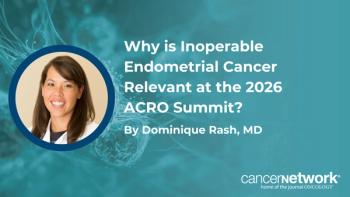
FDA Grants Priority Review to Glofitamab in Relapsed/Refractory LBCL
The biologic license application for glofitamab for managing relapsed or refractory large B-cell lymphoma is supported by findings from the phase 1/2 NP30179 study.
The FDA has accepted a biologic license application for and granted priority review to glofitamab for the treatment of adult patients with relapsed or refractory large B-cell lymphoma (LBCL) following 2 or more lines of therapy, according to a press release from Roche.
Acceptance of the application was supported by data from the phase 1/2 NP30179 study (NCT03075696) in which investigators assessed the safety, efficacy, and pharmacokinetics of glofitamab in patients with relapsed or refractory LBCL. Findings from the study indicated that the agent produced an objective response rate (ORR) of 51.6% (n = 80/155), with complete responses (CRs) observed in 40.0% (n = 62/155) of patients.
With a median follow-up of 13.4 months, 73.1% of patients who had a CR continued to experience a response at 12 months. The median duration of response (DOR) was not reached. Additionally, the median duration of response was 18.4 months.
In an earlier analysis of the trial presented at the
“Even for patients whose cancer is rapidly progressing, glofitamab given for a fixed duration has shown impressive efficacy and long-term durability, with patients continuing to experience a complete remission after treatment has concluded,” Levi Garraway, MD, PhD, chief medical officer and head of Global Product Development at Roche, said in the press release.
Glofitamab is an investigational T-cell targeting bispecific antibody that targets CD3 on the surface of T cells and CD20 on the surface of B cells.
The primary end points of the multicenter, open-label phase 1/2 NP30179 study included CRs as assessed by independent review committee, dose limiting toxicities, and adverse effects (AEs). Secondary end points included ORR, DOR, and PFS.
In the study, 85.1% of enrolled patients were refractory to their most recent therapy and 33.1% had received previous CAR T-cell therapy.
Patients 18 years and older with measurable disease defined as a nodal lesion longer than 1.5 cm in its longest dimension or an extranodal lesion longer than 1.0 cm in its longest dimension were eligible to enroll on the study. Additional inclusion criteria included having an ECOG performance status of 0 or 1; a life expectancy longer than 12 weeks; adequate liver, renal, and hematological function; negative serologic polymerase chain reaction test results for acute or chronic Hepatitis B virus infection; and negative test results for Hepatitis C virus and human immunodeficiency virus.
Patients who were unable to comply with protocol mandated hospitalizations and restrictions or who had chronic lymphocytic leukemia, Burkitt lymphoma, or lymphoplasmacytic lymphoma were unable to enroll on the study. Patients were also unsuitable for enrollment if they had known or suspected hemophagocytic lymphohistiocytosis or acute bacterial, viral, or fungal infection at baseline.
The most common AE observed in the trial was cytokine release syndrome (CRS), and a total of 48.1% and 12.3% of patients had grade 1 and grade 2 events, respectively. Most CRS AEs were related to glofitamab treatment in cycle 1. Grade 3 or higher CRS was observed in 3.9% of patients and there was no incidence no grade 5 events. Treatment discontinuation occurred in 1 patient due to CRS.
Reference
FDA grants priority review to Roche’s bispecific antibody glofitamab for people with relapsed or refractory large B-cell lymphoma. News release. Roche. January 6, 2023. Accessed January 6, 2023. bit.ly/3vGALrM
Newsletter
Stay up to date on recent advances in the multidisciplinary approach to cancer.






































